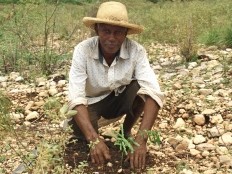|
||||||||||||||||||
|
|
Haiti - Environment : Self-financing model in agroforestry 30/01/2013 14:02:23
In 2010, Timberland teamed up with representatives from the Smallholder Farmers Alliance to create a self-sustaining agroforestry model that would deliver agricultural improvement, environmental restoration and economic growth for participating farmers through the development of eight community tree nurseries and agricultural training centers. This pilot cooperative, which is reliant on private sector, non-profit and community partnership, will plant a million more trees in 2013, 2014 and 2015, for a total of 5 million. "When this program began, our vision was to create a model that could be self-financing within a reasonable amount of time and would generate positive social, environmental and economic impact,” says Margaret Morey-Reuner, Timberland’s senior manager of values marketing. "The great results so far are a testament to the camaraderie, hard work and independence of these farmers as well as to this private sector, NGO and community stakeholder collaboration." The Smallholder Farmers Alliance engaged a group of 2,000 small-scale farmers in the rural area near Gonaives, Haiti, and transformed the group into a for-profit agroforestry cooperative. After just three years of investment, the cooperative continues as a farmer-managed, self-financed operation. This innovation in "exit strategy aid," which sets a time limit on external funding, tackles a key challenge faced by corporate organizations when getting involved in sustainability or disaster relief projects on the ground in developing nations. The farmers volunteer their time to manage the tree nurseries and plant trees in return for agricultural services that result in increased crop yields of between 40 and 50 percent. These services provide high yield seed, training in crop management, in-field technical support and the good quality tools needed to produce higher yields of sorghum, beans, corn and other food items. Farmers sell their crops individually, but the cooperative supports them by paying for these continued services with the sale of excess trees from the farmer-run tree nurseries. "The pilot program represents a break with the traditional development model that often lasts only as long as the external funding," said Hugh Locke, co-founder and president of the Smallholder Farmers Alliance. "Following the pilot’s success, we will launch the next agroforestry cooperative in July when we begin working with the next group of 2,000 farmers in a different location. We’re planning to follow with many more cooperatives as the nation’s farmers start to take the lead in restoring the tree cover – without which no country can prosper sustainably." The true test of the success of this program came when farmers throughout Haiti lost between 40 and 70 percent of their crops as a result of hurricanes Isaac and Sandy last year. Income from tree sales enabled cooperative members to purchase extra seed to replant their storm-damaged fields, and the cooperative took care of each other without turning to government or donor sources for assistance. Timberland continues to be the principal sponsor of the Smallholder Farmers Alliance, and has collaborated with NGO’s including the Clinton Global Initiative to identify a customer base and sustainable market based solutions for the members of the farmer cooperative. See also : https://www.haitilibre.com/en/news-4703-haiti-economy-the-timberland-company-manufactures-its-shoes-in-ouanaminthe.html HaitiLibre
|
|
|
Why HaitiLibre ? |
Contact us |
Français
Copyright © 2010 - 2024 Haitilibre.com |



